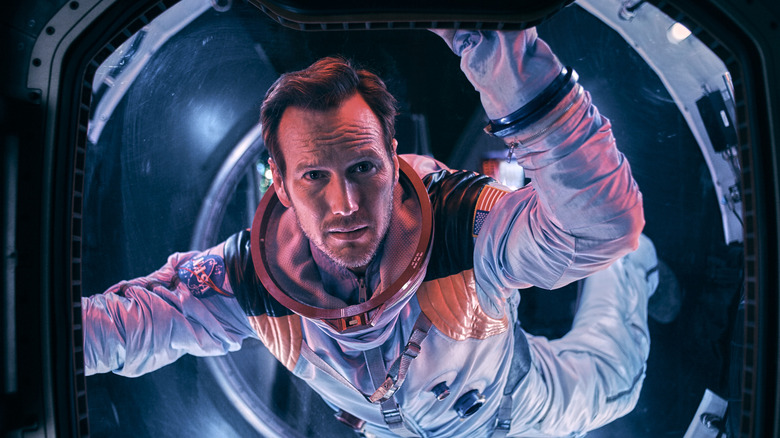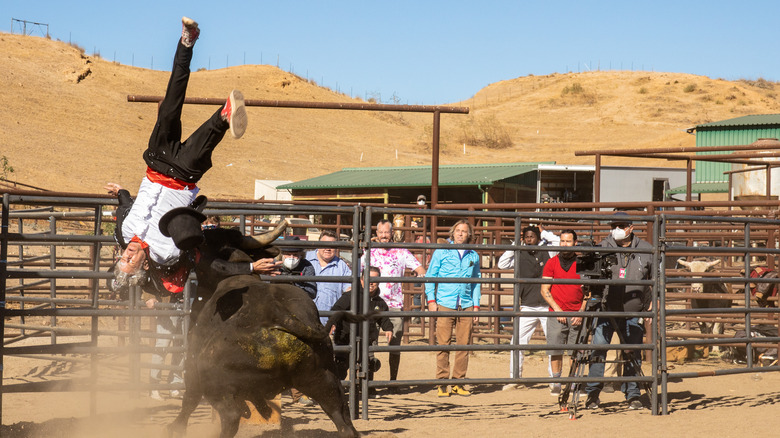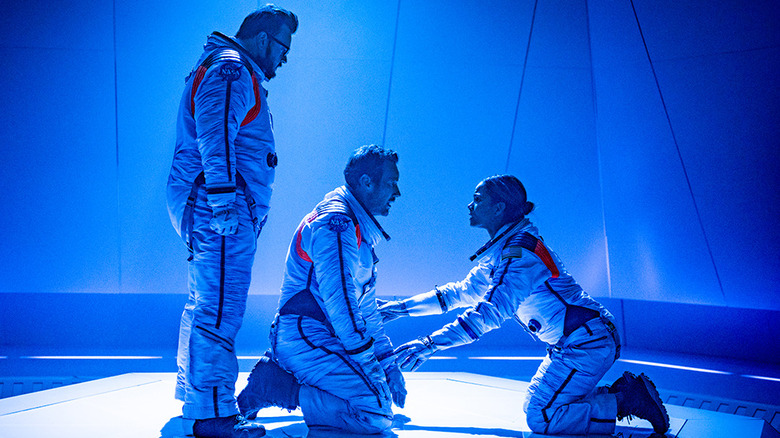Why Was Moonfall A Flop?
2022 was expected to kick off with a box office bang with the release of Roland Emmerich's "Moonfall." The filmmaker behind such blockbusters as "Independence Day" and "2012" may not have the best reputation among critics, but his body of work has continuously gotten butts in seats. So, it was a shock for many to see how "Moonfall" eventually performed in theaters during its run, quickly becoming one of the year's biggest box office bombs. But when breaking it down, it's not hard to see why.
The science fiction disaster flick sees the world under threat as the moon hurtles toward Earth. Two astronauts and a conspiracy theorist must then embark on an adventure to halt the moon from its impending collision course. When the film came out in February 2022, it wasn't only the moon crashing and burning. In its opening weekend, the film brought in just $9.8 million, followed by a 70% decline in the second week. "Moonfall" ended its theatrical run with a measly $67.3 million worldwide gross, only making back a fraction of its $150 million production budget. When also considering the money put into the film's distribution and marketing costs, some sources estimate the film lost Lionsgate upwards of $139 million.
"Moonfall" was a far cry from Emerich's heyday of box office glory, but when peeling back the layers, there were several aspects that worked against the film's favor.
Moonfall had some stiff competition
February may not be the hottest time for moviegoers, but nevertheless, "Moonfall" had its thunder taken by some surrounding releases. On its opening weekend, "Moonfall" came in second to "Jackass Forever," the fourth entry in the fan-favorite comedy franchise. The Paramount film had an opening weekend gross of over $23 million, more than double the $9.8 million brought in by "Moonfall."
Other new releases were also fighting for the audience's attention at the time. Movies such as "Marry Me," "Dog," "Death on the Nile," and "Uncharted" all came out in February, with the latter two overtaking the top box office spot in the second and third week of the theatrical run of "Moonfall." Even holdovers from previous months ended up besting "Moonfall," with movies such as "Spider-Man: No Way Home," "Sing 2," and "Scream" managing to top the sci-fi film by its second week and fully kicking it out of the domestic top 10 by its third.
As audiences were coming out of the COVID-19 pandemic, "Moonfall" premiered when the industry was learning what audiences were willing to see in theaters. An end-of-the-world disaster flick may not have been the right call at this time, but that's far from the only thing that kept "Moonfall" from connecting with moviegoers.
Bad reception plagued its release
Roland Emmerich has never been a darling among the film critic community. Of his 20 critic-reviewed films on Rotten Tomatoes, only two have "Fresh" scores, with "Independence Day" having a 68% and "The Patriot" at a 62%. And while "Moonfall" is far from his worst-reviewed effort, it's safe to say that the film's reception didn't help it in the long run.
Currently, "Moonfall" has a 35% Tomatometer score on Rotten Tomatoes, with the critical consensus reading, "Whether 'Moonfall' is so bad it's good or simply bad will depend on your tolerance for B-movie cheese — but either way, this is an Emmerich disaster thriller through and through." However, several critics could not even find ironic joy in the film. Empire dubbed "Moonfall" "Roland Emmerich on apocalypse-autopilot," while AV Club claims, "You will actually hear your brain cells commit seppuku as you watch it." However, its audience score on Rotten Tomatoes is much higher, sitting at 70%, which is relatively common for most Emmerich films.
Even if "Moonfall" wasn't the Emmerich movie to win over critics, that didn't stop many of his past efforts from achieving box office success. In this regard, one factor above all likely led to the failure of "Moonfall."
Audiences have lost interest in Emmerich's style of moviemaking
It's easy to forget what a box office titan Roland Emmerich was in his heyday. Movies such as "Stargate," "The Day After Tomorrow," and "2012" were all massive successes during their runs. Notably, "Independence Day" was not only 1996's highest-grossing title, but the film briefly held the title of the second highest-grossing film of all time behind then-champion "Jurassic Park." But in recent years, it seems the director has lost his touch in thrilling audiences.
Since his 2011 film "Anonymous," Emmerich's films have seen an ever-decreasing appeal at the box office. Even what some may call his worst movie, 2016's "Independence Day: Resurgence," the sequel to his biggest hit, was considered a financial disaster, not even bringing in half of what its predecessor managed. This isn't even counting the weakened performance of non-Emmerich disaster movies from the last few years, with films such as 2016's "Deepwater Horizon" and 2017's "Geostorm" also failing to make their money back.
With movie trends such as superhero blockbusters and IP-driven adaptations taking up much of the market nowadays, along with the disaster genre's overall lack of evolution since the 1990s, it's easy to see how "Moonfall" got added to this pile of disappointing ventures. While Emmerich still has his fair share of fans, there seemed to be nothing eye-catching enough in his latest disasterpiece to entice new viewers.



